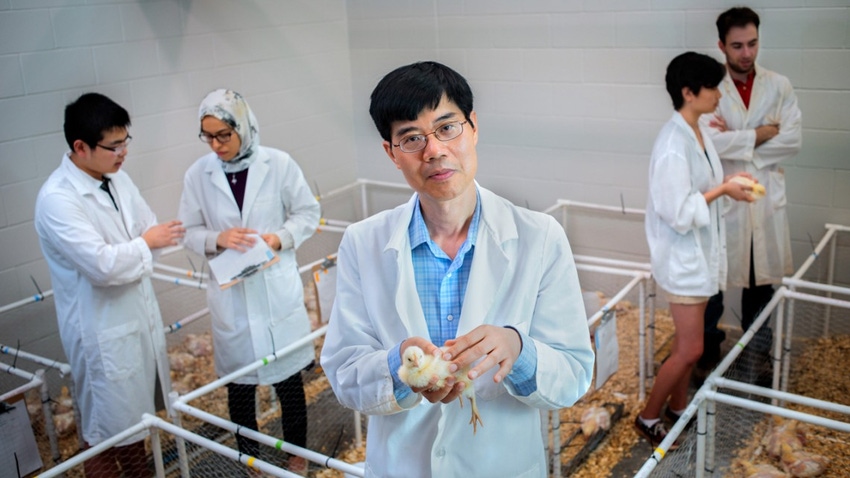Project is component of $10 million grant co-led by Cornell and University of Arkansas.
November 7, 2019

When the University of Arkansas announced its participation in an ambitious, $10 million grant to transform poultry nutrition and water use, Cornell University was announced as a project co-lead. The grant, awarded by the National Institute of Food & Agriculture on Sept. 1, is among the largest grants ever awarded by the U.S. Department of Agriculture.
“Poultry is a major animal source of protein to Americans, so it will be a great opportunity for us to improve production efficiency, quality of the meat and economic returns with added values for the producers,” said co-principal investigator Xingen Lei, professor in the Cornell department of animal science in the College of Agriculture & Life Sciences. “It’s an effective way for us to make an impact.”
One of the projects Lei will lead involves using microalgae as an alternative feed protein. “What we want to do in this case is use microalgae to replace soybeans. This will reduce the competition between feed and food,” he said. “Also, microalgae captures carbon dioxide from the atmosphere, and this will make production greener.”
Lei said his lab has already made strides working with algae as a protein-rich food source, but the algae is more expensive than soybean meal, which is the current source of protein in commercial poultry diets. He said his goal is to improve the nutritional quality and the environmental value of the feed while making it more affordable and practical for farmers to use.
Through microalgae, researchers can introduce enzymes that favor unsaturated fatty acids and vitamin D. In collaboration with Kimberly O’ Brien, professor with the Division of Nutritional Sciences in the Cornell College of Human Ecology, Lei will look for ways to improve the chickens’ overall health and, by extension, the consumers' health.
O’Brien said she will lead studies at the Human Metabolic Research Unit investigating potential biological benefits for people who eat bio-enhanced poultry.
Researchers at the University of Arkansas will be developing ways to improve chickens’ gut health and resistance to disease, in addition to exploring how the industry can use water more efficiently.
One of the grant’s sustainability components also involves a collaboration between Cornell researchers Jefferson Tester, professor in the Smith School of Chemical & Biomolecular Engineering, and Johannes Lehmann, the Liberty Hyde Bailey professor of soil and crop sciences in the School of Integrated Plant Science.
The researchers will process poultry manure and other food waste sources in order to produce energy in the form of biogas, bio-oil, electricity and biochar, Cornell said. Through techniques such as hydrothermal liquefaction and pyrolysis, they can recycle carbon and nutrients in cost-effective, environmentally sustainable ways.
“We are interested in developing methods for producing both energy and recovering nutrients,” Tester said.
“We’ve all been working on innovations, and through this grant, we can bring all of those together in ways that haven’t been attempted before,” said Walter Bottje, a poultry science faculty member at the University of Arkansas and co-principal investigator for the grant. “We are hopeful that some of what we do will have global implications.”
The University of Arkansas-Pine Bluff, Mississippi State University and Iowa State University are also collaborating on the grant.
You May Also Like


.png?width=300&auto=webp&quality=80&disable=upscale)
